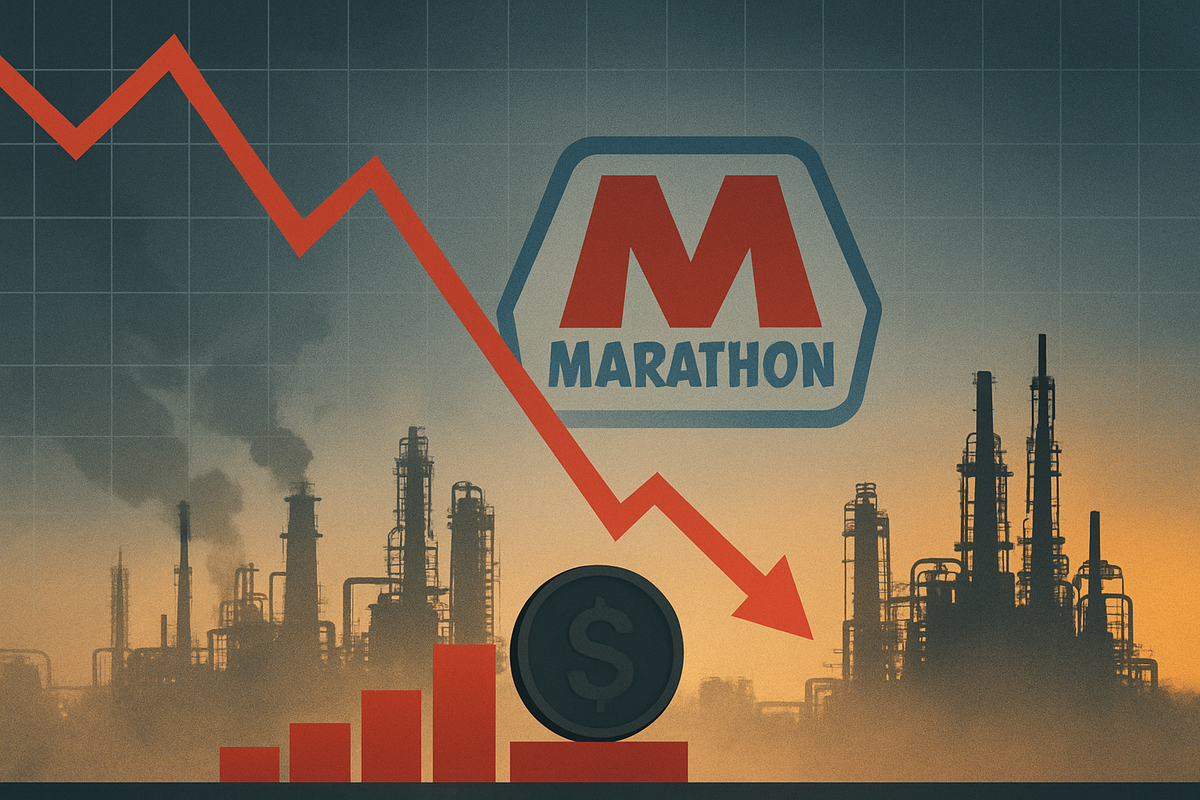
Houston, TX – November 5, 2025 – Marathon Petroleum (NYSE: MPC) experienced a significant stock selloff yesterday, November 4, 2025, following the announcement of its third-quarter 2025 earnings, which fell notably short of analyst expectations on the profit front. Despite a robust revenue beat, the refining giant's adjusted earnings per share (EPS) of $3.01 missed consensus estimates, triggering a decline of 5% to 7.01% in pre-market and early trading. The immediate market reaction underscores investor sensitivity to profitability metrics, even as the underlying demand for refined products remains strong.
The unexpected earnings miss has prompted a re-evaluation among investors regarding the short-term operational challenges faced by the company. While the energy sector has largely benefited from a favorable commodity price environment, Marathon Petroleum's Q3 performance highlights the intricate balance refiners must maintain between capturing strong crack spreads and managing escalating operational costs, particularly those associated with maintenance and renewable fuel initiatives.
Elevated Costs and Refinery Headwinds Weigh on Q3 Performance
Marathon Petroleum’s third-quarter 2025 earnings report, released on November 4, 2025, painted a complex picture for investors. While the company impressively surpassed revenue expectations, reporting figures between $34.81 billion and $35.85 billion against estimates of $32.88 billion to $33.53 billion, its adjusted EPS of $3.01 per share fell short of analyst projections, which had ranged from $3.11 to $3.19. This discrepancy between strong top-line growth and weaker-than-expected profitability immediately sent shockwaves through the market, leading to a swift and pronounced stock selloff.
The primary culprits behind the earnings shortfall were identified as significantly higher planned turnaround costs and increased operating expenses within its refining segment. Marathon Petroleum disclosed approximately $400 million in refining planned turnaround costs for Q3 2025, a substantial increase from $287 million in the same period last year. These elevated maintenance expenditures, crucial for ensuring refinery reliability and efficiency, directly impacted the bottom line. Furthermore, refining operating costs climbed to $5.59 per barrel, up from $5.23 per barrel in Q3 2024, with a notable jump in the U.S. Gulf Coast to $4.70 per barrel from $3.96 per barrel a year ago. The downtime at the Galveston Bay refinery, one of the nation's largest, following a fire in June, further exacerbated the situation, impacting the Gulf Coast capture rate and overall refining results. Adding to these challenges, the company's Renewable Diesel segment continued to struggle, posting a negative adjusted EBITDA of $56 million due to higher feedstock costs, which offset the benefits of stronger diesel prices and RIN values.
Key players involved in this event include Marathon Petroleum's management team, responsible for operational execution and strategic guidance, and institutional and retail investors, whose reactions directly influenced the stock's immediate trajectory. Analysts from major financial institutions also played a crucial role in shaping market expectations and subsequently interpreting the earnings results. The initial market reaction was unequivocally negative, with the stock's sharp decline reflecting investor disappointment and concerns about the company's ability to translate robust refining margins into commensurate profitability in the short term. The connection between refining results and commodity prices was evident, not just in the overall crack spreads that favored the revenue beat, but also in the specific impact of elevated feedstock costs on the Renewable Diesel segment's profitability.
Refining Peers and Oil Producers Face Scrutiny
Marathon Petroleum's (NYSE: MPC) Q3 earnings miss and subsequent stock selloff send a ripple through the broader energy sector, particularly affecting refining peers and, to a lesser extent, oil producers. For Marathon Petroleum itself, the immediate impact is a dent in investor confidence and a downward pressure on its stock price. While the company's long-term strategic initiatives, such as its focus on optimizing its refining footprint and advancing its renewable fuels strategy, remain in place, the short-term operational hurdles highlighted in the Q3 report will undoubtedly lead to increased scrutiny from analysts and investors in the coming quarters. The market will be looking for clear signs that the company can effectively manage turnaround costs and improve the profitability of its renewable diesel segment.
Competitors in the refining space, such as Valero Energy (NYSE: VLO) and Phillips 66 (NYSE: PSX), will be closely watched. While each company has its unique operational footprint and strategic priorities, the challenges faced by Marathon Petroleum regarding elevated turnaround costs and the profitability of renewable fuels could signal broader industry trends. If these issues are systemic, other refiners might also face similar pressures on their margins and profitability, potentially leading to a re-evaluation of their stock valuations. Conversely, if Marathon Petroleum's issues are largely idiosyncratic, its competitors might see an opportunity to gain market share or demonstrate superior operational efficiency.
For oil producers, the impact is more indirect. While refining margins are influenced by crude oil prices, the primary concern for refiners like Marathon Petroleum is the "crack spread"—the difference between the price of crude oil and the refined products. Higher feedstock costs impacting renewable diesel profitability, as experienced by MPC, highlight how volatility in specific commodity markets can affect downstream operations. However, as long as global demand for crude oil remains robust, the fundamental business of oil producers like ExxonMobil (NYSE: XOM) or Chevron (NYSE: CVX) is less directly impacted by a single refiner's operational challenges, though overall refining profitability does influence the demand for crude.
Broader Industry Trends and Regulatory Landscape
Marathon Petroleum's Q3 earnings miss, while specific to the company's operational execution, resonates with broader industry trends within the refining sector. The refining industry is inherently cyclical and capital-intensive, characterized by periods of robust profitability followed by leaner times. The current environment, marked by strong demand for refined products and generally healthy crack spreads, is being increasingly challenged by rising operational costs, particularly for maintenance and regulatory compliance. The elevated turnaround costs reported by MPC are a testament to the ongoing need for significant capital expenditure to maintain the safety, efficiency, and environmental performance of large-scale refining assets.
The struggles in the Renewable Diesel segment, specifically the negative adjusted EBITDA due to higher feedstock costs, highlight a critical challenge facing the energy transition. While there is a strong policy push towards renewable fuels, the economics can be volatile, heavily influenced by commodity prices for feedstocks (like soybean oil or used cooking oil) and the fluctuating value of Renewable Identification Numbers (RINs). This situation underscores the complexities and financial risks associated with investing in and operating renewable fuel facilities, even with government incentives. It suggests that while the long-term outlook for renewable fuels is positive, the path to consistent profitability can be bumpy.
Regulatory and policy implications are also at play. The mandates for renewable fuel blending, such as the Renewable Fuel Standard (RFS) in the U.S., create a market for renewable diesel and RINs. However, the design and implementation of these policies can inadvertently contribute to feedstock price volatility and affect the profitability of refiners engaged in renewable fuel production. Any changes or reforms to these policies could significantly alter the economic landscape for companies like Marathon Petroleum. Historically, the refining sector has faced similar challenges, where strong demand environments were occasionally undermined by unforeseen operational disruptions or escalating costs. The industry continually adapts to these dynamics, often through strategic divestitures, capacity expansions, or technological upgrades to improve efficiency and reduce costs.
Navigating the Path Forward: Short-Term Hurdles, Long-Term Vision
Looking ahead, Marathon Petroleum faces immediate challenges in regaining investor confidence and demonstrating improved operational execution. In the short term, the market will closely monitor the company's ability to manage its planned turnaround costs, especially with a forecast of approximately $420 million in Q4 2025. Investors will also be keen to see a clearer path to profitability for the Renewable Diesel segment, potentially through feedstock diversification, improved operational efficiencies, or more favorable market conditions for RINs and renewable fuel pricing. Analyst revisions to earnings estimates and stock price targets are likely in the wake of the Q3 miss, reflecting a more cautious near-term outlook.
However, despite these immediate headwinds, the long-term outlook for Marathon Petroleum (NYSE: MPC) appears to remain largely intact. The fundamental demand for refined products – gasoline, diesel, and jet fuel – is expected to persist for the foreseeable future, supported by global economic activity and transportation needs. Marathon Petroleum's strategic position as a leading refiner with a diversified asset base and significant retail presence (through Speedway and its marketing operations) provides a strong foundation. The company's ongoing commitment to optimizing its refining portfolio, investing in high-return projects, and expanding its renewable fuels capabilities aligns with broader energy transition trends and positions it for future growth, provided it can navigate the current operational complexities.
Potential strategic pivots or adaptations may include an intensified focus on cost control across all refining operations, a re-evaluation of its renewable diesel feedstock procurement strategy, or further investments in technologies that enhance refinery efficiency and reduce maintenance downtime. Market opportunities could emerge from sustained strong crack spreads, assuming crude oil prices remain favorable relative to refined product prices, and from any future policy developments that provide more stable and predictable economics for renewable fuels. Challenges will continue to include commodity price volatility, regulatory uncertainty, and the ongoing need for significant capital investment to maintain and modernize its extensive asset base. Over the next few quarters, investors will be watching for signs of improved operational performance, clearer guidance on cost management, and progress in turning around the renewable diesel segment's profitability.
A Resilient Refiner in a Dynamic Market
Marathon Petroleum's (NYSE: MPC) weaker-than-expected Q3 2025 earnings serve as a stark reminder that even in a generally favorable market environment, operational execution and cost management are paramount. The key takeaways from this event are the significant impact of elevated turnaround costs and the ongoing challenges in achieving consistent profitability within the nascent renewable diesel sector. While the company's revenue performance demonstrated robust demand for its products, the miss on the bottom line underscores the pressures on refining margins from the cost side.
Moving forward, the market will be assessing Marathon Petroleum's ability to address these operational hurdles effectively. The company's strong asset base, strategic positioning, and commitment to both traditional refining and renewable fuels suggest a resilient long-term outlook. However, investors will demand clear evidence of improved cost control and a more stable profit trajectory from its renewable diesel ventures. The event also highlights the broader industry's need to balance capital-intensive maintenance requirements with the evolving landscape of energy transition initiatives.
Investors should closely watch several factors in the coming months: Marathon Petroleum's Q4 2025 earnings guidance and actual results, particularly concerning turnaround costs and operating expenses; any updates on the performance and strategic direction of its Renewable Diesel segment; and the overall trajectory of refining crack spreads and commodity prices. While the immediate stock selloff reflects short-term disappointment, the underlying value proposition of a diversified and efficient refiner like Marathon Petroleum remains compelling for those with a long-term investment horizon, provided it can successfully navigate these operational complexities.
This content is intended for informational purposes only and is not financial advice






